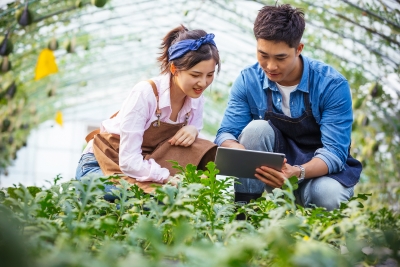Seeds, crop protection products and digital services for ever more sustainable agricultural solutions

BASF strengthens its activities in research and development (R&D) for sustainable agricultural innovations, helping farmers to overcome environmental and economic challenges as well as meeting consumers’ demand for more sustainably produced food.
With solutions launching throughout the next decade, the pipeline supports the company’s aim to annually increase its sales share of agricultural solutions with substantial contribution to sustainability by 7%.
By 2030, more than 30 major R&D projects will complement BASF’s connected offer of seeds and seed treatment products, chemical and biological solutions, as well as digital services. This brings the pipeline to an estimated peak sales potential of more than €7.5 billion. In 2020, BASF spent €840 million in R&D in the Agricultural Solutions segment; representing around 11% of the segment’s sales. In 2021, the company will continue to invest in R&D of agricultural innovations at a high level.
“BASF leads in solutions for sustainable agriculture. In addition to developing innovations, we also provide a connected offer, combining effective products as well as new technologies and services, tailored to customers’ needs and their different crop systems around the world,” said Vincent Gros, President of BASF’s Agricultural Solutions division.
BASF has committed to ambitious sustainability targets for its agriculture business by 2030: Besides increasing the annual sales share of sustainable agricultural solutions, farmers will be supported in reducing their CO2 emissions by 30% per ton of crop produced. Further, the company strives to apply digital technologies on more than 400 million hectares of farmland cumulatively by 2030, while continuing to ensure the safe use of its products. BASF remains committed to developing solutions that drive the transformation of the agricultural food system for the better. “Sustainability is engrained in our entire R&D process. It leads the way in how we develop our innovations, which support farmers produce more and better while preserving natural resources,” Gros emphasized.
By 2050, farmers will have to feed an estimated 9.7 billion people, requiring an increase in productivity of 50%. Digitalization has the potential to make an important contribution to this. The company is therefore advancing its digital technologies together with other innovations across its whole portfolio. This combination allows farmers to achieve better yield on existing arable land, while supporting biodiversity preservation.
In November 2020, BASF and Bosch signed a joint venture agreement to globally market and sell smart farming solutions from a single source in the future. Through the joint venture, which is subject to the approval of the relevant antitrust authorities, the companies plan to launch the Smart Spraying solution this year. The new technology recognizes weeds and allows a precise application of herbicides, which maximizes productive land-use and reduces the environmental impact by lowering the volume of herbicides applied.
Subscribe to our newsletter & stay updated.